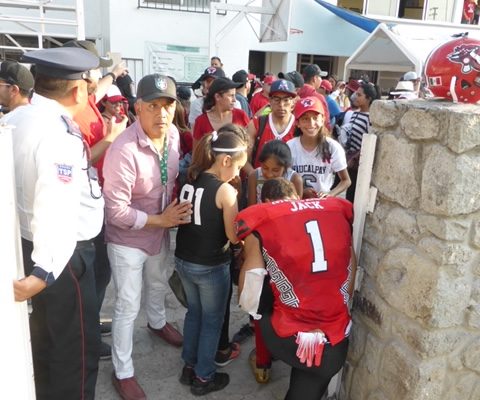Canadian players relishing early Mexican experience

Canada’s two official languages may be English and French, but for a small number of Canadian football players Spanish has become an important third language.
Last year, the Canadian Football League dove head-first into an ambitious plan to grow the game of football globally by signing an alliance with the Mexican Liga de Futbol Americano. It was the first of 14 partnerships that saw international talent play in the league under a brand-new Global designation beginning last season.
While Mexico is now just one of many nations with players north of the 49th parallel, it has maintained a special place in the initiative and become the proving ground for the second phase of what has been dubbed “CFL 2.0”. Earlier this year, LFA teams drafted 25 Canadian players hoping for another shot in the world of professional football. Both leagues have high hopes that their alliance will develop into a fully fledged developmental system for the CFL, similar to the farm systems that exist in other major North American sports.
Three weeks into the new LFA season, the 19 Canadians who ultimately made the journey southward have played a variety of crucial roles alongside their Mexican and American counterparts. To a man, they seem to be enjoying the experience.
“Honestly, it’s what I expected.” said Archelaus Jack, a receiver for the Mexicas of Mexico City who previously spent training camps with the Saskatchewan Roughriders and B.C. Lions. “A lot of great coaches, a lot of great players. The teams, the fans, the organization, just overall a really good experience so far. I’m happy I came.”
That sentiment was echoed by his opponent on Saturday, Toluca Osos’ defensive lineman Ian Marouf.
“It’s been wonderful. The people are great and the level of competition is really, really good.” raved the former sixth round draft pick of the Winnipeg Blue Bombers. “There is a lot of raw talent that hasn’t been seen yet and the LFA is a growing league. It’s only a matter of time until the players get recognized.”
Canadian players shouldn’t expect to come down and dominate the young league either.
“It’s certainly a little bit of an adjustment compared to CIS (now USports).” admitted former Montreal Alouette fourth-round pick Alex Morrison, referencing the Canadian college system. “I just think it’s more so getting used to the differences within the game. Eleven men, different defenses, etcetera.”
For the players already on the ground in Mexico, that hope of a true developmental league seems like a very real possibility.
“I think a lot of people in Canada, ex-teammates, guys I played against, that are still very good and on the cusp of playing in the CFL know its all about getting the right opportunity.” said Morrison. “I think people who are serious enough, especially Canadians, can continue playing to get another shot or an opportunity in the CFL, a chance to develop. This would be a great place to do that.”
Asked if they would recommend the experience of playing far from home, the Canadian contingent did not stutter.
“Absolutely, absolutely!” asserted Jack. “A lot of great exposure here. The fans are great. Just great competition.”
“Of course. Hands down, no questions asked.” Was Marouf’s exclamation, grinning ear to ear. “Everyone who comes down here loves the experience and just the opportunity itself.”
The Mexican players also see the value of the Canadian acquisitions.
“All the guys are excellent players.” gushed Osos’ defensive lineman Jose Humberto Paniagua Inostrosa. “I feel very happy because there is great talent in the league with these guys!”
To the untrained outsider, playing as complex a sport as football without the benefit of a common first language may seem daunting. It appears that has only been a minor hurdle for the LFA’s newest players.
“What I first thought when I first came down was that it would be really, really tough,” Marouf admitted. “but actually the people are very well educated down here. I mean, so many people speak very good English.”
Jack explains that language has not been a barrier:
“Honestly, they were open to me. I learned some Spanish; they learned some English. We just came together as one because, at the end of the day, we are just trying to get a W and it doesn’t matter if I speak French or Chinese.”
For the Osos, the secret to a Week 3 performance that saw the defense combine for over half a dozen sacks was actually that very same obstacle.
“I think the communication is so good between us.” said Paniagua Inostrosa, pointing to Marouf while explaining the duo’s success.
For Marouf, there is another key to integrating with Mexican culture that is not quite as easily replicated.
“I have a girlfriend who speaks very good English too, she helps out a lot.” he says with a sly smirk “That’s kind of the secret.”